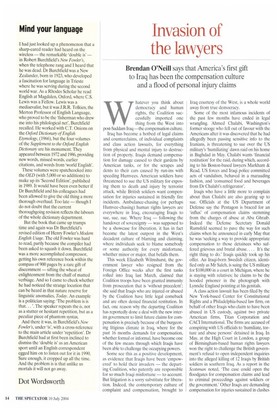Mind your language
I had just looked up a phenomenon that a sharp-eared reader had heard on the wireless — the remarkable 'double is' — in Robert Burchfield's New Fowler's, when the telephone rang and I heard that he was dead. Dr Burchfield was a New Zealander, born in 1923, who developed a fascination for language in Trieste where he was serving during the second world war. As a Rhodes Scholar he read English at Magdalen, Oxford, where C.S. Lewis was a Fellow. Lewis was a mediaevalist, but it was J.R.R. Tolkien, the Merton Professor of English Language, who proved to be the 'fisherman who drew me into his philological net', Burchfield recalled. He worked with C.T. Onions on the Oxford Dictionary of English Etymology, (1966), but the four volumes of the Supplement to the Oxford English Dictionary are his monument. They appeared between 1972 and 1986, providing new words, missed words, earlier citations, and words from 'world English'.
These volumes were spatchcocked into the OED (with 5,000 or so additions) to make up its 'Second Edition', published in 1989. It would have been even better if Dr Burchfield and his colleagues had been allowed to give the old thing a more thorough overhaul. Too late — though I do not doubt that the current thoroughgoing revision reflects the labours of the whole dictionary department.
But the book that came up trumps time and again was Dr Burchfield's revised edition of Henry Fowler's Modem English Usage. The old Fowler was hard to read, partly because the compiler had been asked to squash it down. Burchfield was a more accomplished compressor, getting his own reference book within the compass of 900 pages by a rare gift of discernment — sifting the wheat of enlightenment from the chaff of matted verbiage. And so I came to check whether he had noticed the strange locution that can be heard in that nature reserve for linguistic anomalies, Today. An example is a politician saying: 'The problem is is that. . '. The speaker repeats the is, not as a stutter or hesitant repetition, but as a peculiar piece of phantom syntax.
And there it was, in Burchfield's New Fowler's, under 'is', with a cross-reference to the main article under 'repetition'. Dr Burchfield had at first been inclined to dismiss the 'double is' as an American sport until an English correspondent egged him on to listen out for it in 1990. Sure enough, it cropped up all the time. And the problem is is that unlike us mortals it will not go away.
Dot Wordsworth


























































 Previous page
Previous page